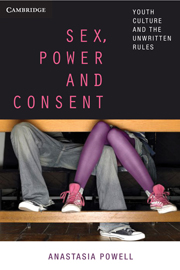4 - Power
Framing sexual violence in young people's everyday encounters
Published online by Cambridge University Press: 03 May 2011
Summary
A number of social and cultural unwritten rules regarding sex, love and consent influence young people's capacity to negotiate their love/sex relationships. While these rules can situate women, particularly, in positions that limit their ability to actively negotiate love/sex relationships, they do not necessarily always benefit men either, as they similarly limit men's ability to express alternative masculinities. This chapter considers how we can account for the persistence of young women's experiences of pressured and unwanted sex by examining the sociocultural understandings of gender, love, sex and consent. At issue is how we can understand both the extent to which young people's experiences across the sexual violence continuum are influenced by these broader social and cultural understandings, and the capacity for young people to re-write the rules. Drawing on the sociological theory of Pierre Bourdieu and engaging with postmodern feminist and gender theorists, in this chapter I further develop a framework for conceptualising sexual violence in light of the persistence of gender inequalities and power imbalances in the negotiation of consent while at the same time acknowledging the important ways that young people can and do exercise agency to re-negotiate ethical and consensual sex. First, however, I discuss some of the views and experiences that young people have shared with me about pressure, coercion and their sexual encounters.
- Type
- Chapter
- Information
- Sex, Power and ConsentYouth Culture and the Unwritten Rules, pp. 55 - 85Publisher: Cambridge University PressPrint publication year: 2010



